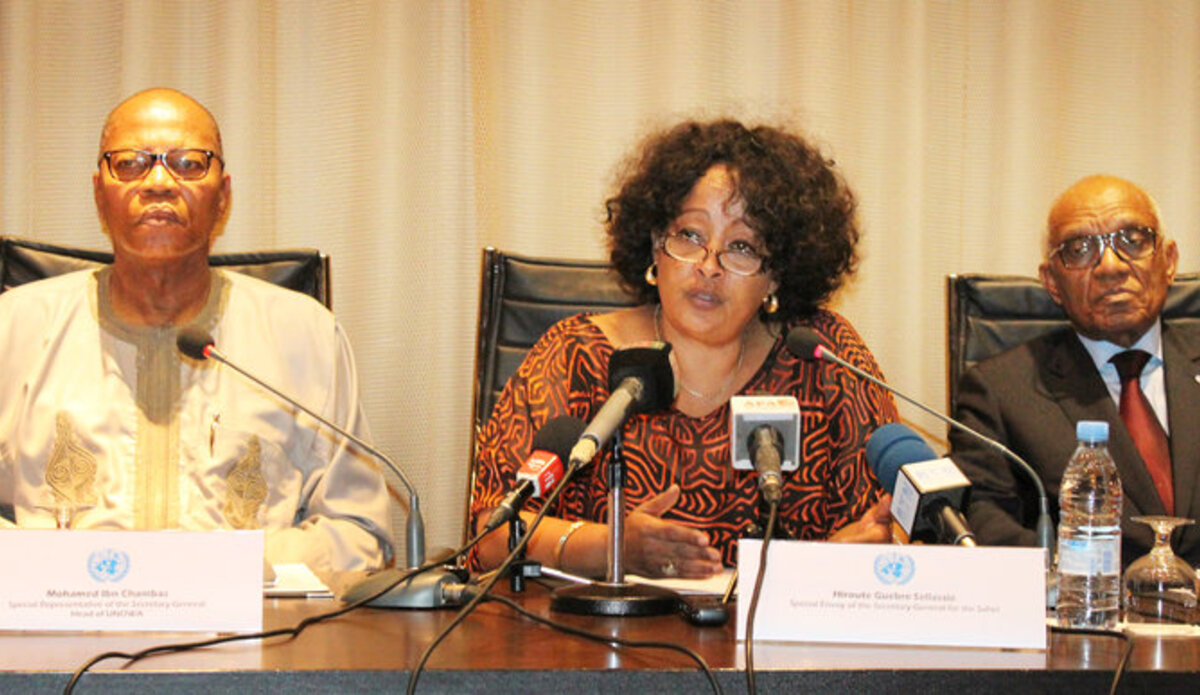Special Envoy for the Sahel and head of OSES, Hiroute Guebre Sellassie. UNOWA Photo
Political, security and humanitarian situation
UN Response through the Integrated Strategy for the Sahel
Main Documents
Despite national, regional and international efforts to tackle the complex range of inter-connected challenges facing the Sahel, the region continues to be threatened by cyclical instability, state fragility and recurring humanitarian crises. Limited capacity in the region to effectively deliver basic services and foster dialogue and citizen participation contributes to grievances, leaving a vacuum exploited by terrorist and criminal groups. Efforts to stabilise Mali and prevent further destabilization in the Sahel are threatened by the continuing activity of terrorist and criminal groups, as well as the spread of violent ideology across the Sahel region.
The Sahel region continues to face a food insecurity crisis with 20 million people at risk and nearly 5 million children at risk of acute malnutrition.
The United Nations Integrated Strategy for the Sahel [S/2013/354], endorsed by the Security Council in June 2013, is a promising new instrument for conflict prevention. The strategy prioritizes life-saving activities that meet immediate needs, while building the resilience of people and communities as part of a long-term development agenda. The strategy emphasizes the need for continued UN good offices to mobilize political will and resources to address the challenges in the region. It includes a range of innovative actions in the areas of Governance, Security and Resilience. For the implementation of the integrated strategy for the Sahel, the United Nations applies a flexible definition of the broader Sahelo-Saharan region, encompassing West, Central and North African countries, while placing a particular emphasis on five core Sahel countries: Burkina Faso, Chad, Mali, Mauritania and Niger.
In the area of Governance, it involves a combination of (1) capacity-building measures, aimed to improve the delivery of essential services, and (2) political inclusion, aimed to promote broad consensus amongst the population over the country’s priorities. In terms of security, the strategy focuses on strengthening border management. Given the vastness of the Sahel region, and the length and porosity of many of the borders, the strategy entails a combination of capacity building measures and the promotion of collaborative efforts among States. Collaborative management of borders is not only about constraining the activities of criminals and terrorists, but also about giving opportunity to legitimate economic activity. The third overall objective of the strategy is focusing on supporting vulnerable households and promoting food and nutritional security, while also building capacity for long term resilience.
To reach a broad consensus, the Secretary-General convened a high-level meeting on the Sahel, on the margins of the 68th UN General Assembly. At the meeting, all countries of the region, as well as donor countries and institutions, expressed their support for the strategy and emphasized the importance of regional and national ownership. In addition, the Secretary-General of the United Nations, the Chairperson of the African Union, the President of the World Bank, the President of the African Development Bank and the European Development Commissioner jointly visited the region in November 2013. They highlighted the challenges and opportunities for the implementation of the strategy and mobilized resources and political support. Likewise, during a ministerial-level meeting on the Sahel, organized by the Government of Mali during the visit, the region welcomed the Integrated Strategy and agreed on a broad set of common priorities. They decided to continue meeting every six months, on a rotating Chairmanship basis.
The implementation of the strategy relies on the strong engagement of the United Nations System in the region, under the overall leadership of the Special Envoy of the Secretary-General for the Sahel, Hiroute Guebre Sellassie. SESG Guebre Sellassie has already begun to develop a coordination mechanism for UN system-wide action, in close collaboration with UNOWA and other relevant UN presences in the region.
More information about the UN Integrated Strategy for the Sahel is available on the OSES website.
- Report of the Secretary-General on the situation in the Sahel region - S/2014/397 - (FR/EN)
- Report of the Secretary-General on the situation in the Sahel region - S/2013/354 - (FR/EN)
- Statement by the President of the Security Council - S/PRST/2013/10 (FR/EN)
- Resolution 2056 (2012) - S/RES/2056 (2012) (FR/EN)
Fact Sheet (EN)

